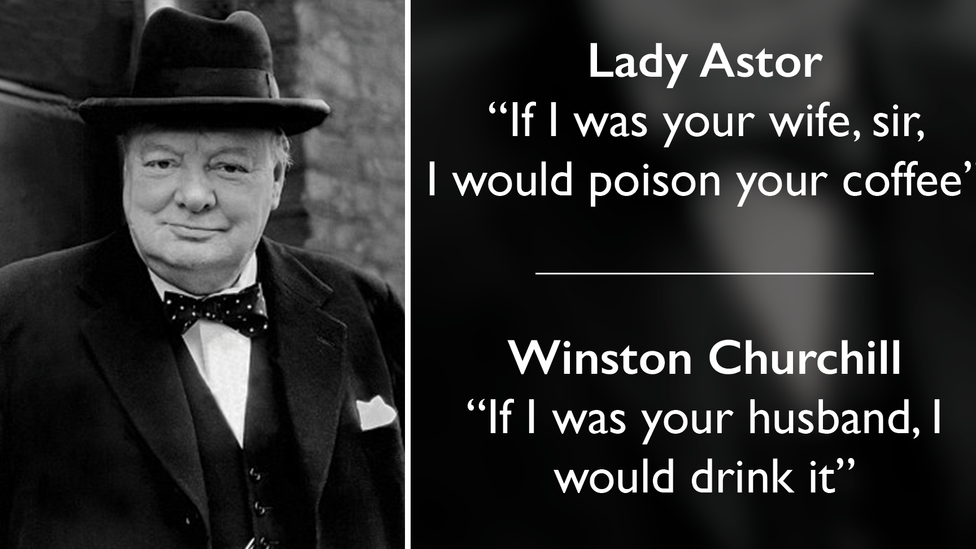Funny Retort Being in the Middle
The secret to a quick-witted comeback

Find yourself on the receiving end of a barbed remark? Try these retorts to win the war of linguistic acrobatics.
H
Have you ever worked with someone who was so insecure, overwhelmed or fearful, that he or she constantly spewed negative smart-aleck remarks, off-colour comebacks or thinly veiled insults?
A snide "Oh that's real smart," or "Nice try, but try again," spoken in muffled tones can catch you off guard, leaving you surprised and unable to form a clever comeback. Sometimes you think of the ultimate retort — but two days later when you've had time to fume and consider a few choice words. By then, it's too late.
Timing is everything and that means your witty answer must be as fast as the words that took you by surprise. The key to coming up with a winning retort is to hone your listening skills so that you can respond at lightning speed.

Think you can do better than Churchill? Click this link to send us your best comeback.
Off the cuff
Of course, witty comebacks can't be planned. They can only be made in the moment using the unexpected material you get from the other person by listening actively and precisely, experts say.
Abigail Paul, the artistic director at the Theatre Language Studio (TLS) in Frankfurt, says people think faster than others speak, giving the listener "extra time" to compose an answer, even while they give the appearance of still listening to what the other person is saying.
How many times have you been on a conference call and already had an idea to share, an answer to a question or solution to a problem before the person on the line has even finished his sentence? The same listening skills and thought processes apply when a conversation turns sour and your defence needs to kick in.
The question is how to refocus that extra time you have while you're listening, said Paul, who teaches improvisation theatre techniques.
"Most of us don't listen to the whole message, we are just waiting to make our own points. There is no magic bullet to getting better at listening besides practice," she said.
One strategy to hone listening skills is through a simple game of one-word volleyball, where two people build a story by rapidly taking turns to add a word to what the other said immediately before. The game forces players to listen actively and respond spontaneously.
"The goal is that we let go of our own ego and our own ideas because a huge part of listening is that you really have to be willing to be changed by what's being said," Paul said.
In the case of snide remarks, if you know your colleague has a tendency to make them, train your brain to listen to his or her words carefully and be prepared to remark quickly to defuse the situation. "You take away the control factor," she said.

Listening closely is often the key to a quick comeback (Credit: iStock)
Replying to the rude
Comebacks to have on hand
- "Oh I'm sorry that the middle of my sentence interrupted the beginning of yours."
- "I'm sorry for talking while you're interrupting. Please, you go first."
- "I hope the rest of your day is as pleasant as you are."
Source: Reddit.com
If a colleague tells you, "Oh that's real smart," Paul says she might try this: "Thanks. I don't always receive praise for my intelligence."
Or "That's the best you can do?" Try: "I'm afraid so. Where do we go from here?"
Another idea is to try and swallow your pride and raise the status of the other person. "Status" used in this sense comes from the rules of improvisation theatre, where it's a must that you make your stage partner look good.
Let's say a manager or colleague takes a swipe at you repeatedly. Paul suggests the "status move," which is best conveyed in tone of voice.
"You could respond to 'Would you suggest something better?' with 'Well, I see you've got some great ideas already, but I think we could perhaps make the whole thing work even better'" said Paul.
"Of course, with the wrong tone, they would all come out nasty. It's not really about the text, so much as it is the tone."
Don't stoop to the same level
There's something to be said for killing someone with kindness and often the best retorts are comebacks that are witty, take the higher moral ground, are appropriate and most importantly, positive.
According to Belina Raffy, a business improvisation consultant who once worked with a condescending manager, when banter turns toxic, it means death for innovation. "It kills all ideas in the office," she said. Worse, it leaves a negative drag on other people's energy and tears teams apart.
When a negative comment is made in a work setting — where, presumably, everyone wants to see projects succeed and keep their jobs — those comments usually come from a place of insecurity, Raffy said.
For example, a colleague may be unsure how to approach a particular task — he may believe that throwing the attention back to somebody else with a negative retort will remove the focus on his real or perceived ineptitude.

Looking for some inspiration? Comeback master Stephen Colbert isn't a bad place to start (Credit: Getty Images)
Though it may be tempting to respond in kind, positive comments are a far better tool for keeping projects on track while showing your love of linguistic acrobatics. Others will find the humour in them and you may see negative interactions quickly cease. If a colleague says, "this project is going nowhere fast," you could say, "at least it's going and I intend to steer it in the right direction."
In fact, says Raffy, positive witty comments build trust among colleagues, bosses and subordinates, and they can turn a formerly harsh environment into an accepting one, where everyone's opinion matters.
Negative comments do the opposite. "They increase tension, make a person feel excluded or inferior, and as though they are not in the 'in group' which is in the know," she said.
Raffy recommends trying to reveal the "ridiculousness of the situation," without making the antagonist into the bad guy. Rather turn them into the "victim" of the absurd circumstances, she says.
But there's one more pointer for nailing a strong comeback that will send a wave of positive energy through those around you. "The best retorts speak truth — when a person calls something that the other people didn't see," said Paul. "That's generally what makes us laugh."
And usually that's the end goal of a witty comeback — to get a laugh. A shared laugh is a great way to reduce tension, it makes people feel included and reinforces what's easy to forget — that we are all in this together.
Got a witty comeback? Share it with BBC Capital on ourFacebook page or message us on Twitter .
Source: https://www.bbc.com/worklife/article/20160328-the-secret-to-a-quick-witted-comeback
0 Response to "Funny Retort Being in the Middle"
Post a Comment